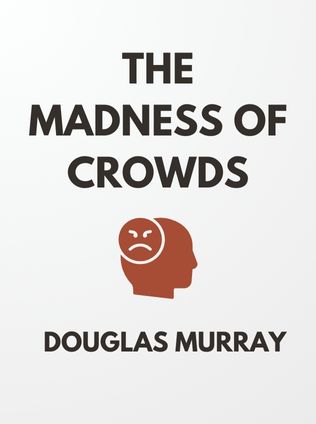
The Madness of Crowds
Gender, Race and Identity
By Douglas Murray
Published 09/2019
About the Author
Douglas Murray, a prominent British author, journalist, and political commentator, is known for his incisive critique of modern social and political trends. Murray has built a reputation for addressing controversial topics with clarity and conviction, often challenging prevailing narratives. His previous works, such as The Strange Death of Europe, delve into the consequences of mass migration and cultural changes in Europe. As an assistant editor at The Spectator and a frequent guest on conservative platforms, Murray’s voice resonates strongly in discussions about free speech, identity politics, and the direction of Western society.
Main Idea
In The Madness of Crowds, Douglas Murray argues that Western society is increasingly dominated by an ideology he refers to as the "New Ideology," characterized by a hyper-focus on social justice, identity politics, and wokeism. Murray contends that this ideology, while rooted in the desire to correct historical injustices, has morphed into an intolerant movement that stifles free speech, polarizes society, and undermines the very principles of liberal democracy. He warns that if this trend continues unchecked, it could lead to greater societal fragmentation, chaos, and even violence.
Table of Contents
- Wokeism and Its Religious Overtones
- The Pillars of the New Ideology: Wokeism, Intersectionality, and Identity Politics
- Origins of the New Ideology: Historical, Social, and Intellectual Developments
- Impacts of the New Ideology: Free Speech and Societal Contradictions
- Consequences and Remedies: A Call to Action
Wokeism and Its Religious Overtones
Murray likens modern wokeism to a new form of religious zealotry. He draws parallels between the behaviors and beliefs of woke activists and those of early Protestant reformers. Just as Protestants sought to purify the Catholic Church, wokeists seek to cleanse society of perceived injustices. However, Murray argues that this pursuit of moral perfectionism has become dangerous, leading to a culture of “witch hunts” where dissenters are publicly shamed and ostracized.
“Modern wokeism, much like the religious fervor of the past, demands unwavering adherence to its doctrines, leaving no room for dissent or debate.” – Douglas Murray
The Pillars of the New Ideology: Wokeism, Intersectionality, and Identity Politics
Murray identifies three main pillars supporting the New Ideology: wokeism, intersectionality, and identity politics. These pillars, he argues, form the foundation of a worldview that prioritizes group identity over individual merit and seeks to redistribute power based on perceived historical injustices.
Social Justice and Wokeism
The first pillar, wokeism, is defined by an extreme concern with social justice issues, particularly those related to race, gender, and sexuality. While awareness of social injustice is important, Murray argues that modern wokeism has taken this concern to an unhealthy extreme. It now views any perceived slight against a minority group as evidence of systemic oppression, leading to a culture of moral superiority and a “mob-like” mentality.
“Wokeism has evolved from a legitimate concern for social justice into an intolerant movement that brooks no disagreement.” – Douglas Murray
Sign up for FREE and get access to 1,400+ books summaries.
You May Also Like
Freakonomics
A Rogue Economist Explores the Hidden Side of Everything
By Steven D. Levitt and Stephen J. DubnerI Am Malala
The Story of the Girl Who Stood Up for Education and Was Shot by the Taliban
By Malala Yousafzai



















